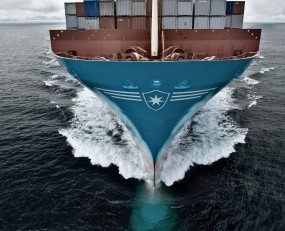
Maersk’s CEO has been discussing his company’s corporate strategy. In an interview that appeared in the Wall Street Journal, Soren Skou outlined his plans for the future of the largest container shipping company.
He did not mention any specifics that have not been communicated by Maersk previously, however the company that he describes is very different from how Maersk looks today. For example he asserts that “today up to 80% of our earnings comes from container shipping….hopefully a couple of years from now will be much closer to a 50-50 scenario between ocean and non-ocean services.”
Skou specifically mentioned that Maersk was looking to provide inland, non-marine related physical asset services for major clients: “We want to run the warehouse, receive the goods, stuff it into containers, ship it to the U.S. and provide a data feed that says the yellow swim trunks are in that box…then we take it out of the containers, and send the goods by trucks to distribution centres closer to the final delivery point.” This is a description of a contract logistics operation.
Bearing in mind the degree to which AP Moller Maersk has already transformed itself through the sale of assets in order to concentrate on shipping and ports, the shift to half its business being non-marine logistics suggests that the company will continue a process of transformation at a furious pace. Maersk has been investing in physical assets, such as a new cold store in St Petersburg. It has also been investing in transformative web-based booking and visibility tools. Of course, it still owns a freight forwarder. However, to shift its business away from shipping so dramatically will take a lot of investment or a large acquisition.
Soren Skou’s remarks also strongly suggest that Maersk will become a direct competitor of the major forwarders and logistics service providers. This is not unique, with CMA CGM’s acquisition of Ceva being a direct challenge to such companies who are also large customers. Nonetheless, the markets he is entering are marked by strong competitors and making any business here profitable will demand a lot of work. Container shipping may be characterised by poor margins and low returns on capital, however forwarding and contract logistics is hardly easy.
Source: Transport Intelligence, June 27, 2019
Author: Thomas Cullen